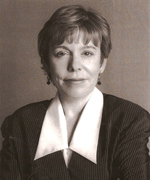Saturday 17 January 2009 afternoon ceremony
 Karen Armstrong (DLitt) Karen Armstrong (DLitt)
Karen Armstrong is one of the world’s leading commentators on religious affairs. She is a best-selling author, whose books have been translated into forty-five languages. Her early work focused on the monotheistic faiths of Judaism, Christianity and Islam, but she has since begun to explore the eastern religions.
Karen Armstrong spent seven years as a Roman Catholic nun in the 1960s, but then left her teaching order in 1969. She studied English Literature at the University of Oxford, earning the degrees of BA and MLitt. Since then she has taught modern literature at the University of London, and headed the English department in a girls’ public school. In 1982, she became a full time writer and broadcaster.
Her television work has included The First Christian, a six-part documentary series on St. Paul, which she wrote and presented [1984] and two interview series: Varieties of Religious Experience [1984] and Tongues of Fire [1985]. She now regularly appears on radio and television to comment on religious affairs in England and the United States, and is a frequent contributor to conferences, panels, newspapers and periodicals on both sides of the Atlantic and is a regular columnist for the Guardian newspaper.
For ten years, Karen Armstrong taught part-time at the Leo Baeck College for the Study of Judaism and the Training of Rabbis and Teachers. She has also been honoured by the Muslim Council for Public Affairs (USA) in 1999 and the Muslim Association of Social Sciences (UK) in 2004 for her work in building bridges with the Islamic world.
Her books include: Through the Narrow Gate, an autobiographical work [1981]; The Gospel According to Woman [1986]; Holy War, The Crusades and their Impact on Today’s World [1988]; Muhammad, A Biography of the Prophet [1991]; A History of God [1993], which became an international bestseller; Jerusalem, One City, Three Faiths [1996]; and In the Beginning, A New Interpretation of Genesis [1996]; The Battle for God, A History of Fundamentalism [2000]; and Islam, A Short History [2000]; Buddha (2001); The Spiral Staircase: A Memoir (2004); A Short History of Myth (2005).The Great Transformation: The Beginning of Our Religious Traditions (2006); Muhammad: A Prophet for our Time (2006) and, most recently, The Bible: A Biography (2007).
Since September 11, 2001, however, she has become chiefly known for her work on Islam and Fundamentalism, particularly in the United States. She has addressed members of the United States Congress and the Senate on three occasions, has participated in the World Economic Forum in New York and Davos, has spoken at study days at the United Nations and at the NATO Naval Defense College in Rome, and has addressed the Council for Foreign Relations in Washington and New York. She has also advised members of the Dutch parliament about Islam and the integration of Muslim communities in Europe.
In 2005, she was appointed by Kofi Anan to take part in the United Nations initiative “The Alliance of Civilizations.” This was sponsored by the Prime Ministers of Spain and Turkey to counter the so-called “clash of civilizations” theory; its object was to give practical guidelines to member states about how to stem the rising tide of extremism. She was one of the members of the High Level Group, a panel of twenty people from every region of the world, who did not represent their countries but had been chosen for their expertise in this matter. Karen Armstrong is now an UN Ambassador for the Alliance.
She is increasingly invited to speak in Muslim countries. In 2007 she was awarded a medal for Arts and Sciences by the Egyptian government for her services to Islam under the auspices of the prestigious Al-Azhar madrassah, the first foreigner to have been awarded this decoration. In the summer of 2007, she was invited by the Malaysian government to speak in Kuala Lumpur (even though her books are banned there!) and gave the Muis Lecture in Singapore. She also spoke at the Young Presidents’ Organization in Istanbul and later that year she gave the keynote address at an international conference on Islamophobia there. In January 2008, she visited Pakistan, where gave lectures on Islam in Lahore, Islamabad and Karachi to packed audiences.
In autumn 2001, Karen Armstrong was Scholar in Residence at Lowell House, Harvard University, where she also delivered the Tillich Lecture (2001), the Peabody Lecture (2002), the Ingersoll Lecture on Immortality (2005) and the William Beldon Noble Lectures (2007).
She has received honorary degrees at Aston University in the West Midlands, where her books are required reading on the MBA course, and at Georgetown University, Washington DC. In 2008 she was awarded the Franklin J Roosevelt Four Freedoms Medal for her work on religious liberty.
In February 2008, she was awarded the TED prize and is currently working with TED on a major international project to create, launch and propagate a Charter of Compassion, created on line by the general public, crafted by leading thinkers in Judaism, Christianity and Islam, which will be signed in 2009 by a thousand religious leaders.
|






